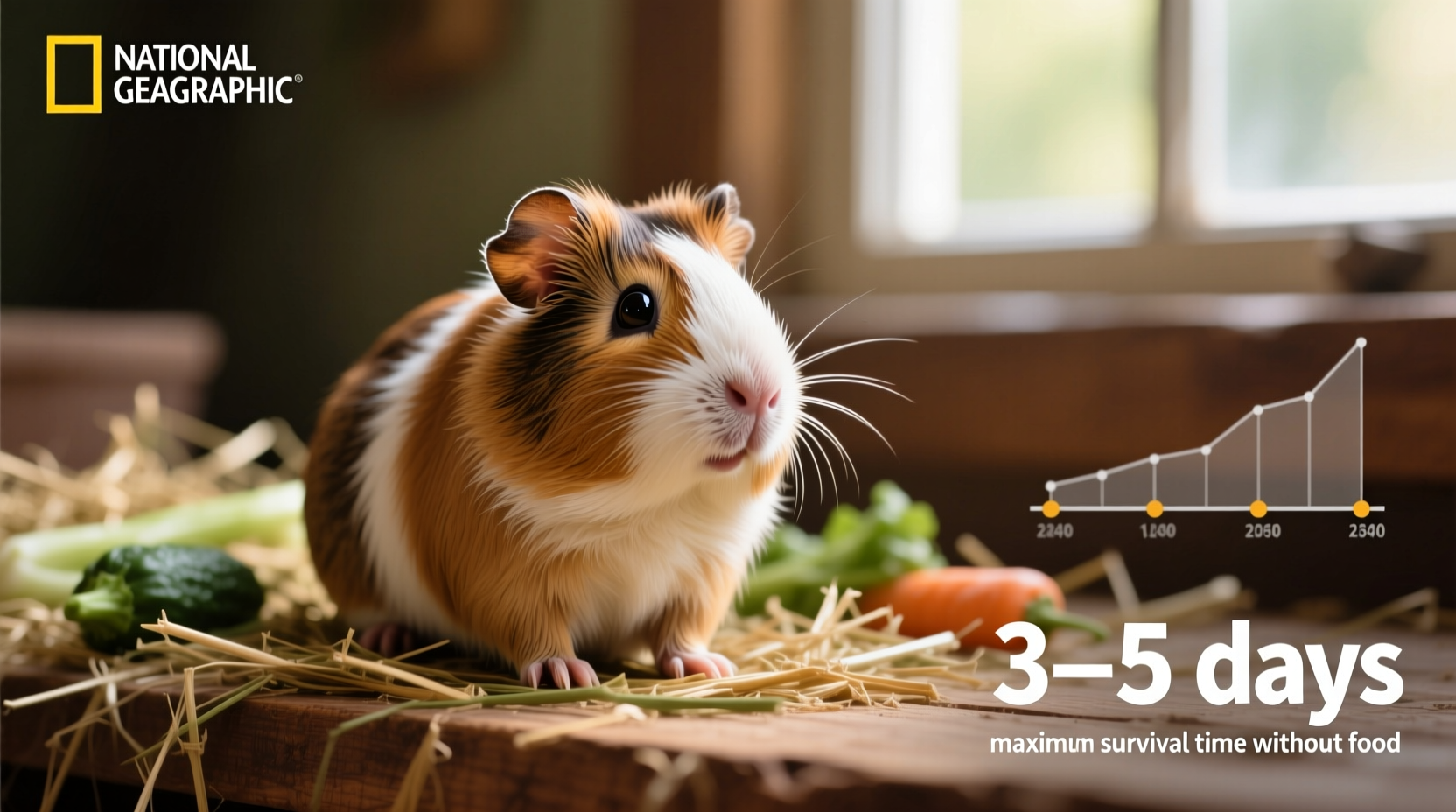Why Guinea Pigs Can't Skip Meals Like Other Pets
Unlike cats or dogs, guinea pigs have a specialized digestive system designed for continuous foraging. Their cecum—a fermentation chamber housing beneficial bacteria—requires constant fiber intake to maintain motility. When food stops flowing:
- Within 12 hours: Gut bacteria begin dying, disrupting nutrient absorption
- 18-24 hours: Dangerous GI stasis develops as digestion halts completely
- Over 24 hours: Hypoglycemia and organ failure become imminent risks
According to the American Veterinary Medical Association, this metabolic vulnerability makes timely intervention critical—delaying veterinary care beyond 12 hours significantly reduces survival chances.

Spotting the Silent Crisis: Early Warning Signs
Guinea pigs instinctively hide illness, making early detection challenging. Monitor for these subtle indicators that your pet hasn't eaten:
| Normal Behavior | Warning Signs | Urgency Level |
|---|---|---|
| Continuous chewing sounds | Silent cage environment | High (4+ hours) |
| Round, firm droppings | Small, misshapen, or absent droppings | Critical (6+ hours) |
| Active exploration | Hunched posture with eyes half-closed | Emergency (immediate vet) |
This behavioral timeline from the RSPCA's guinea pig care guidelines shows how quickly conditions deteriorate. Young guinea pigs (under 6 months) and seniors (over 5 years) face even narrower survival windows due to less metabolic resilience.
Emergency Protocol: First 6 Hours Without Food
If you discover your guinea pig hasn't eaten:
- Immediate assessment: Check for dental issues (overgrown teeth), spoiled food, or environmental stressors
- Offer critical nutrition: Syringe-feed 10ml of Critical Care® formula every 2 hours (available at veterinary clinics)
- Maintain warmth: Keep environment at 72-75°F (22-24°C) to prevent hypothermia during recovery
- Contact vet immediately: Even if symptoms seem mild—GI stasis requires professional treatment
Never attempt home remedies like force-feeding regular food or administering human medications. The Merck Veterinary Manual emphasizes that improper feeding techniques can cause aspiration pneumonia.
Preventing Food Emergencies: Daily Care Essentials
Proactive care prevents most feeding emergencies:
- Constant hay access: Timothy hay should make up 80% of diet—provide unlimited fresh supply
- Daily monitoring: Weigh your guinea pig weekly; sudden weight loss indicates problems
- Stress reduction: Maintain consistent routines—guinea pigs stop eating during environmental changes
- Dental checks: Inspect front teeth weekly for proper alignment and length
Remember that guinea pigs require 30-50mg of vitamin C daily through fresh vegetables. The University of Illinois Extension program notes that vitamin C deficiency (scurvy) often triggers appetite loss, creating a dangerous cycle.
Recovery and Long-Term Management
After a food deprivation incident, recovery requires careful management:
- Follow veterinary instructions for medication and syringe feeding
- Maintain constant physical contact—guinea pigs eat better when comforted
- Gradually reintroduce fresh vegetables over 72 hours
- Schedule follow-up exams to monitor gut motility recovery
Complete recovery typically takes 3-7 days with proper care. However, recurrent appetite issues may indicate underlying conditions like dental disease or respiratory infections requiring specialized treatment.
Frequently Asked Questions
Can guinea pigs survive 48 hours without food?
No, guinea pigs cannot safely survive 48 hours without food. Most develop fatal gastrointestinal stasis within 24-36 hours. The maximum survival window is typically 36 hours under ideal conditions, but irreversible damage usually occurs well before this point.
What should I do if my guinea pig stops eating at night?
If your guinea pig stops eating overnight, check for droppings first thing in the morning. Absent or abnormal droppings for 12+ hours require immediate veterinary attention. While waiting for the appointment, maintain warmth and offer syringe feeding with veterinary-approved formula every 2 hours.
How long can guinea pigs go without hay specifically?
Guinea pigs should never go without hay for more than 6-8 hours. Since hay provides the essential fiber for digestive motility, even short interruptions can trigger gut slowdown. Continuous hay access is non-negotiable in proper guinea pig care.
Do guinea pigs eat less in winter?
Guinea pigs may eat slightly more in colder temperatures to maintain body heat, but should never stop eating. If your guinea pig eats less during winter, check cage temperature first—cold environments below 65°F (18°C) cause appetite loss. Maintain consistent feeding patterns year-round.











 浙公网安备
33010002000092号
浙公网安备
33010002000092号 浙B2-20120091-4
浙B2-20120091-4